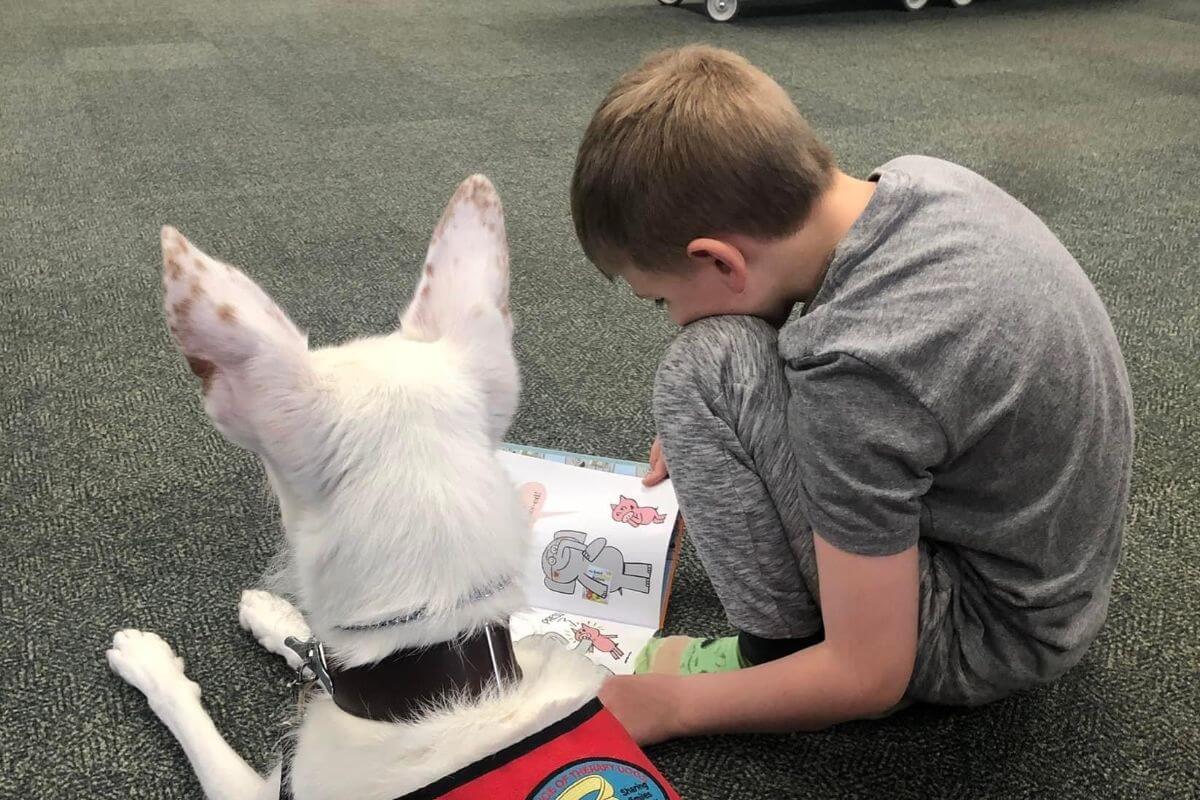
AKC Humane Fund ACE Award Winner – Therapy Dog: Tuffie
Interview with Amy McCarthy, the handler of Therapy Dog, AKC Humane Fund ACE Award Winner – Therapy Dog Tuffie.

Home » Dog Sports » AKC Therapy Dog

The American Kennel Club (AKC) Therapy Dog Program is a testament to the remarkable impact that dogs can have on human lives. This program recognizes and celebrates the volunteer service provided by dogs and their owners in various therapeutic settings. Unlike Service Dogs, which are trained to perform tasks for individuals with disabilities, Therapy Dogs are trained to provide comfort, affection, and joy to a broad range of people.
The AKC Therapy Dog Program was developed in response to the growing recognition of the therapeutic effects dogs have on humans. These positive influences have been observed in numerous settings, including hospitals, schools, nursing homes, and disaster areas. The program’s primary aim is to acknowledge the invaluable contribution of dogs towards improving emotional, psychological, and physical aspects of human health.
The presence of Therapy Dogs has shown to yield significant benefits in various environments:
Therapy Dogs are known for their ability to uplift moods, provide comfort, and bring smiles in times of stress or loneliness. Their role is especially crucial in settings where individuals cannot maintain pets of their own, offering patients and residents a chance to interact with a compassionate animal companion.
It is important to distinguish Therapy Dogs from Service Dogs. Service Dogs are trained to perform specific tasks for individuals with disabilities and have legal access rights to various public spaces. In contrast, Therapy Dogs do not have the same access rights and are primarily focused on providing emotional support and comfort. Misrepresenting a Therapy Dog as a Service Dog is both unethical and illegal.
The AKC Therapy Dog Program offers several titles, each reflecting a different level of commitment and experience in therapy work. These titles are a way to recognize the dedication and effort of Therapy Dogs and their handlers in providing comfort and support to people in need.
To earn these titles, Therapy Dogs must be:
Earning an AKC Therapy Dog title is not just about the recognition. It symbolizes the dog and handler’s dedication to bringing joy and comfort to others. It also represents the handler’s commitment to responsible dog ownership and the well-being of their dog. These titles can encourage others to participate in therapy work and highlight the important role that dogs play in improving human lives.

On the journey towards becoming a recognized Therapy Dog in the AKC Therapy Dog Program, dogs and their handlers must navigate through a series of qualifications and training that ensure they are well-prepared for the role. This process begins with meeting basic age and health criteria, where dogs must be at least one year old and in good health, considering they will be interacting with diverse groups of people, including those with compromised immune systems.
The temperament of a Therapy Dog is crucial; they should exude calmness and friendliness, comfortably mingling with various people in different settings. Aggression or excessive shyness are traits that disqualify dogs from being suitable for therapy work. Alongside temperament, ensuring that dogs are up-to-date on vaccinations and regular health checks is essential to safeguard the health of both the dog and the people they visit.
The training process for a Therapy Dog begins with mastering basic obedience skills. Commands like sit, stay, come, down, and heel are foundational, ensuring the dog is well-behaved and manageable during therapy sessions. A significant milestone in this training journey is achieving the AKC’s Canine Good Citizen (CGC) certification. This program tests a dog’s social skills and manners, aspects that are critical for a Therapy Dog.
However, training for Therapy Dogs goes beyond basic obedience. They undergo specialized training tailored to the unique challenges of therapy work, including exposure to different environments, handling by strangers, and navigating unexpected situations. This specialized training prepares them to be adaptable and comfortable in various therapeutic settings.
Certification is another key component of the process. Dogs must be certified or registered with a Therapy Dog organization recognized by the AKC. These organizations are responsible for evaluating a dog’s readiness for therapy work and ensuring the dog meets the necessary standards. But the training and learning don’t stop there. Therapy Dogs and their handlers are encouraged to engage in continuous training and socialization, enhancing and maintaining their therapy skills.
The handler plays a pivotal role in this partnership. Handlers must be adept at reading their dog’s body language, understanding the dog’s limits, and ensuring the dog’s well-being during visits. Ethical considerations are paramount; handlers must respect the policies of the facilities they visit and make sure the dog’s work is a positive experience for everyone involved.
The process of certifying a Therapy Dog in the AKC Therapy Dog Program involves several key steps. This certification is crucial to ensure that the dogs and their handlers are well-prepared and meet the standards required for therapy work.

Volunteering with a Therapy Dog is a rewarding experience that brings joy and comfort to many. The journey of a Therapy Dog team, comprising the dog and its handler, begins with a commitment to making a positive difference in the lives of others.
The initial step for potential volunteers is to identify suitable facilities and environments for therapy visits. These may include hospitals, schools, nursing homes, and other venues where people can benefit from the therapeutic presence of a dog. Understanding the needs and rules of these facilities is crucial. Some places might have specific requirements or preferences when it comes to Therapy Dog visits.
Before embarking on visits, it is important for the handler to make sure their dog is well-prepared and comfortable with the environment. This includes being familiar with the facility’s layout, the type of interactions expected, and any potential stressors for the dog. Handlers should always have a clear plan for each visit, including the duration and activities planned.
The essence of Therapy Dog visits lies in building relationships with the people they meet. Therapy Dogs often provide emotional support, help to reduce stress and anxiety, and bring smiles to faces. For children, interaction with a Therapy Dog can enhance learning experiences, such as reading programs in schools.
Handlers should be adept at managing different situations that may arise during visits. This includes understanding how to navigate crowded or loud environments, and how to interact with people who have varying levels of comfort with dogs. The handler must always be attentive to the dog’s behavior and well-being, ensuring the dog is not overwhelmed or stressed.
After each visit, it is beneficial for the handler to reflect on the experience, considering what went well and what could be improved. This reflection helps with enhancing future visits and ensuring that both the dog and the people visited have the best possible experience.
The work of a Therapy Dog team goes beyond mere visits. It is about touching lives, providing comfort in difficult times, and bringing a unique form of therapy that only a canine companion can offer. The impact of this work is often profound, leaving lasting impressions on all those whose lives are impacted by the visits.

Interview with Amy McCarthy, the handler of Therapy Dog, AKC Humane Fund ACE Award Winner – Therapy Dog Tuffie.

Interview with John Hunt, handler of a therapy dog known as “Axel,” the 2022 AKC Humane Fund ACE Award Winner.

Can any dog be a therapy dog? Yes! But it will require upfront work, and it is important that you keep your dog’s training up to date.

The most ancient of French dog breeds, the Dogue de Bordeaux, also known as the Bordeaux Mastiff, is a very powerful mastiff-type guard dog.

Explore the various Performance events you can participate in with your fast, agile, fearless, and self-confident Australian Terrier dogs.

In Maria Goodavage’s “Doctor Dogs” we learn about “Dogs who detect cancer, Parkinson’s, dogs who anticipate seizures and more.

"*" indicates required fields
Showsight Magazine–the world’s most influential purebred dog publication since 1992. Each issue reaches a global audience dedicated to preserving the history and health of purpose bred dogs. Filled with award-winning editorial focused on news and insights from the dog show community, top breeders, handlers, AKC Judges, and more!